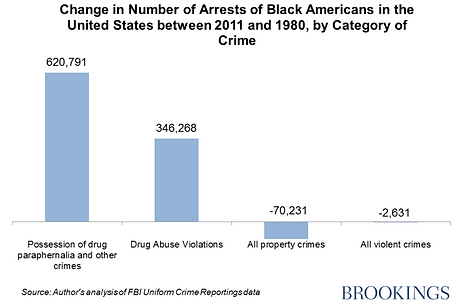
The Criminal Justice System
-
The history of law enforcement in America has a dark and harrowing past that shows the origin of law enforcement has always had the intention of racial oppression.
-
The conception of police stemmed from slave patrols that would originally catch runaway slaves and enforce slave labor laws.
-
Post civil war, the police force in the South would often team up with the KKK to forcefully oppress black communities.
The history of law enforcement plays a major role in the way that black communities and people are treated by the police. Although overt and clear racism has lessened in law enforcement, a growing number of unarmed black men being faced with death at the hands of police paint a different picture.
Law enforcement is just one small piece of the puzzle of racial oppression in the Criminal Justice system. The laws the federal, state, and local governments have passed have all intentionally sought out the mass incrimination of communities of color. Specifically, black communities, where presidential decrees declaring the war on drugs and war on crime disproportionally targeted communities of color.
The war on crime, coined by Lyndon B. Johnson in 1967, was originally made to investigate the ongoing protests being carried out throughout America during that time. What the commissions found was that unrest stemmed from ongoing poverty and social inequality within the minority communities, however, conservative pressures pushed for something more racially motivated. Perpetuating the belief that simply being black causes poverty and crime as opposed to the real underlying reasons. As a result, heavy policing tactics were implemented and social welfare funding fell into the hands of law enforcement. The war on crime, however, was just the beginning.
The War on Crime gave birth to something even more daunting: The War on Drugs. Declared by the Nixon administration in the 1970s, the War on Drugs was never actually made to tackle drug abuse or drug trafficking. It was actually a cleverly constructed political plan to target anti-war leftists and black communities. In fact, John Ehrlichman, advisor and aide to Richard Nixon later even revealed: " We knew we couldn’t make it illegal to be either against the war or blacks, but by getting the public to associate the hippies with marijuana and blacks with heroin, and then criminalizing both heavily, we could disrupt those communities. We could arrest their leaders. raid their homes, break up their meetings, and vilify them night after night on the evening news. Did we know we were lying about the drugs? Of course we did.". Thus giving rise to one of the worst cases of modern oppression on black communities: mass incarceration.
-
As of 2019, African Americans are more than 2.5 times more likely to be killed by the police. Although that statistic decreased from 5 times more likely in 2015, black lives are still being taken.
-
Police treatment of African Americans is also significantly more hostile. 26% of African American citizens report police using profanities in comparison to white citizens.
-
Along with this 39% of African Americans know or have experienced physical violence from the police.
-
Police violence and hostile treatment of black people in America aren't necessarily attributed to direct racism.
-
Implicit Bias is the automatic association individuals make with certain groups of people including stereotypes.
-
From the view of criminal justice, implicit bias significantly impacts police interactions between the police and certain groups of people.
-
Over the course of the war on drugs, arrests for drug possession and distribution skyrocketed.
-
So much so, that well over half of all prison arrests were linked to drugs.
-
Additionally, the introduction of tough-on-crime laws such as mandatory minimum sentencing and three-strikes policies made it especially hard to get out of prison.
-
The war on drugs led to mass incrimination of black individuals and major disruptions of black communities that have long term effects.
-
Don't think this is a race issue? In 1980, Whites were 45% more likely to sell drugs. As of 2012, white teens sold drugs 6.6% of the time in comparison to 5% of black teens.
-
As of 2014, reported drug use among blacks was just 10% which was statistically equal to white drug use.
-
Yet drug charges and arrests among black and Latino communities are significantly higher. Nearly 83% of defendants charged with selling cocaine were black when only 30% of those charged were black.
-
The biggest "shock" of them all is that the War on Drugs was actually ineffective.
-
It led to the era of mass incarceration, widespread political corruption, violence among Latin America and Asia, and created systemic human rights issues in the U.S.
-
It actually ended up strengthening drug cartels, distribution, and use.
-
The U.S. drug enforcement agency created by the War on Drugs has an efficiency rate of only 1% when it comes to stopping drug trafficking.

